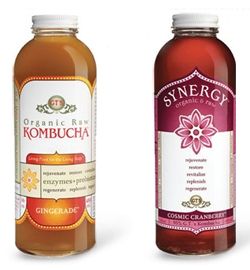Top Class Actions’s website and social media posts use affiliate links. If you make a purchase using such links, we may receive a commission, but it will not result in any additional charges to you. Please review our Affiliate Link Disclosure for more information.

Millennium Products Inc. is the maker of the popular “GT’s” line of fermented tea beverages, which advertises its product as an ancient tea recipe with a modern twist.
Kombucha is generally an effervescent fermented drink of sweetened black tea that’s manufactured and sold by the defendants as a functional food with several unsubstantiated health benefits, the plaintiffs allege in their complaint filed in the U.S. District Court for the Northern District of California.
According to Millennium, the plaintiffs’ first amended complaint does not specify which kombucha products they purchased, in what flavor, the date when any products were purchased, or how they were injured.
This lack of detail makes it impossible to determine which products need to be defended in the action and to what extent under California’s consumer protection laws, the defendants state.
“[P]laintiffs do not provide a single, coherent explanation as to how they believe they were injured by kombucha and what remedies plaintiffs believe they are entitled to, including whether this action is a personal injury action or a food labeling action,” Millennium’s motion said. “Defendants cannot reasonably be expected to mount an appropriate defense if plaintiffs are unable to put forward a consistent theory as to how they were injured.”
Plaintiffs Nina Pedro of California and Rosalind Lewis of Washington originally filed the complaint over alleged injuries and damages they incurred from the Kombucha drinks. Specifically, they argue that because of the secondary fermentation in the bottles, the bottles can explode once the carbon dioxide levels exceed the pressure tolerances of the bottle or cap.
Kombucha can also leak from the cap, causing product spoilage, the plaintiffs say.
Alternatively, some bottles have caps that are on so tight the bottle can’t be safely opened.
Pedro alleges that “on multiple occasions” a kombucha bottle broke its seal and leaked, causing damage to her purses and handbags, as well as their contents.
Additionally, because of the fermentation, the beverages may contain more than 0.5 percent alcohol, the legally allowed limit for a non-alcoholic beverage, Pedro and Lewis allege. However, they aren’t properly labeled, according to the complaint.
Lewis, who alleges she became sick after drinking a bottle of kombucha, seeks to represent consumers who may have allergic reactions to alcohol or other reasons to avoid it.
She seeks injunctive relief in the form of revised labeling or pasteurization techniques to keep consumers from being inadvertently subject to alcohol consumption. Lewis raises a claim under the California Consumer Legal Remedies Act.
Defendants are well aware of the spoilage and leaking problems, from long-standing consumer complaints, widespread problems with leakage during product storage and numerous consumer postings to defendants’ websites, blogs and social media, the proposed class action lawsuit says.
The complaint is replete with examples of postings from consumers, including one who said the drink “shot across the kitchen hitting the far wall” when it was opened, and another who couldn’t get a bottle open, even with a wrench.
Millennium’s argument for dismissal of the proposed class action lawsuit is based on the plaintiffs alleged lack standing to assert claims for injunctive relief because their explanation as to how they were injured by the kombucha drink is all over the map.
At some points, the plaintiffs appear to allege that excessive carbonation in kombucha caused damages to personal property, but at other points, plaintiffs claim that they suffered personal injuries as a result of consuming kombucha products. And still, at other points, plaintiffs appear to characterize this class action as a food labeling case concerning alleged failures to warn consumers that Millennium Kombucha products may contain more that 0.5 percent alcohol by volume, the motion for dismissal states.
“A significant portion of the [first amended complaint] (some 15 pages) consists only of copied and pasted excerpts of consumer complaints,” Millennium argued. “But at no point do plaintiffs clarify whether this is a personal injury case, a property damage case or a food labeling case, or for what type of pecuniary loss they seek redress.”
Pedro and Lewis seek to represent all U.S. consumers who bought Millenium’s GT’s Kombucha products within the last two years. They allege the defendants breached the California Consumer Warranty Act and they also seek damages under California’s Unfair Competition Law.
The plaintiffs are represented by Clayeo C. Arnold and Joshua H. Watson of Clayeo C. Arnold APC; and John A. Yanchunis of Morgan & Morgan Complex Litigation Group.
The Whole Foods Millennium Kombucha Class Action Lawsuit is Nina Pedro, et al. v. Millennium Products Inc., et al., Case No. 2:16-cv-03780, in the U.S. District Court for the Central District of California.
UPDATE: On Jan. 31, 2017, an $8.25 million class action lawsuit settlement between Whole Foods Market Inc., GT ‘s Kombucha and a group of consumers who say the carbonated fermented tea drink falsely labels its alcohol, sugar and antioxidant content was given preliminary approval.
ATTORNEY ADVERTISING
Top Class Actions is a Proud Member of the American Bar Association
LEGAL INFORMATION IS NOT LEGAL ADVICE
Top Class Actions Legal Statement
©2008 – 2024 Top Class Actions® LLC
Various Trademarks held by their respective owners
This website is not intended for viewing or usage by European Union citizens.















One thought on Whole Foods, Kombucha Maker Seek to Toss Exploding Drink Lawsuit
UPDATE: On Jan. 31, 2017, an $8.25 million class action lawsuit settlement between Whole Foods Market Inc., GT ‘s Kombucha and a group of consumers who say the carbonated fermented tea drink falsely labels its alcohol, sugar and antioxidant content was given preliminary approval.